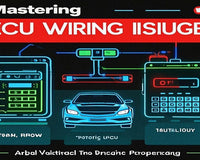Your car horn might seem like a small component, but it’s a critical safety feature. Whether you need to alert a distracted driver, warn pedestrians, or signal in an emergency, a working horn can prevent accidents. So, when it suddenly goes silent, it’s more than just an annoyance, it’s a potential risk. 
Why Did My Car Horn Stop Working?
1. Blown Fuse.
One of the simplest and most frequent culprits is a blown fuse. Car horns draw a small amount of electrical current, and if there’s a sudden surge, the fuse trips to protect the system.
Locate your car’s fuse box. If it’s broken or melted, the fuse is blown.
2. Faulty Horn Relay.
The horn relay acts as a switch, sending power from the battery to the horn when you press the steering wheel. If the relay is faulty, power never reaches the horn, leaving it silent. You might hear a clicking sound when pressing the horn (a sign the relay is trying to work but failing) or nothing at all.
Swap the horn relay, if the horn works after swapping, the original relay is bad.
3. Broken Horn Button or Switch.
The button you press on the steering wheel (or steering column) can wear out over time, especially with frequent use. Dust, debris, or electrical issues can cause the switch to fail, so even if the horn itself is fine, the signal to activate it never gets through.
You can clean the area around the horn, or test it with a UNI-T UT109 multimeter if it's an electrical issue.
4. Corroded or Loose Wiring.
Wiring connects the horn to the battery, relay, and switch. Over time, wires can become loose from vibrations, or corrosion can build up (especially in humid climates or if water gets under the hood). Corrosion blocks the electrical current, while loose wires prevent it from flowing altogether.
Inspect the wires, Look for rust, frayed insulation, or loose connectors. Clean corrosion with a wire brush and apply dielectric grease to protect the connection. Tighten any loose plugs.
5. Horn Motor Failure.
If all the electrical components check out, the horn itself might be dead. The motor inside the horn can wear out over time, especially in older vehicles.
Scanning and diagnosing your car with the FD10 car diagnostics tool can help you quickly identify problems, or contact a professional for an in-depth inspection.
A dead car horn doesn't always happen without warning. You might notice that your car horn’s tone has changed for no apparent reason, volume drop or intermittent working. When you notice one or more of these signs, you’d best have someone troubleshoot or replace the horn to save you the trouble later.
Finding a dead car horn when you need it most can be a hair-raising experience. Regularly inspecting components can help prevent sudden failures. Keep your horn in working order, and you’ll be ready to alert others and stay safe in any situation.










